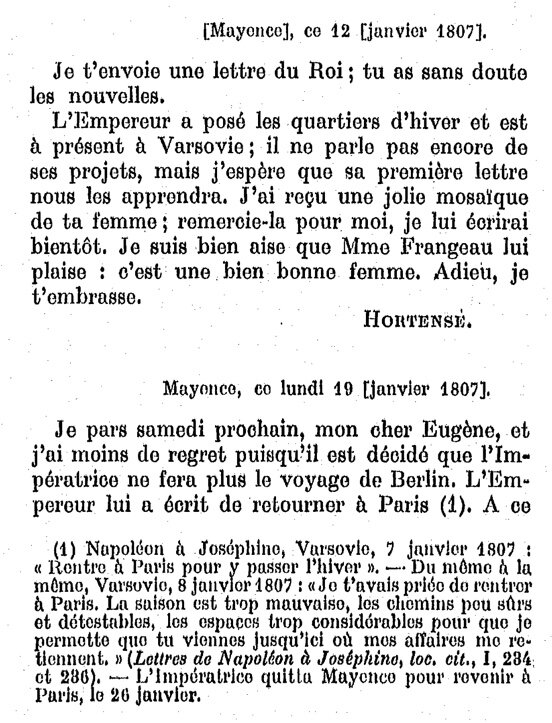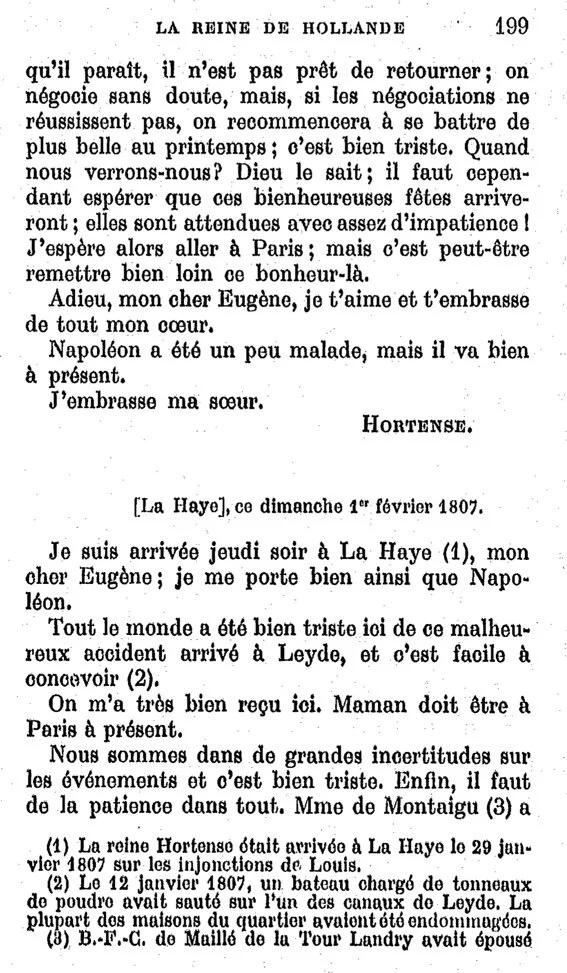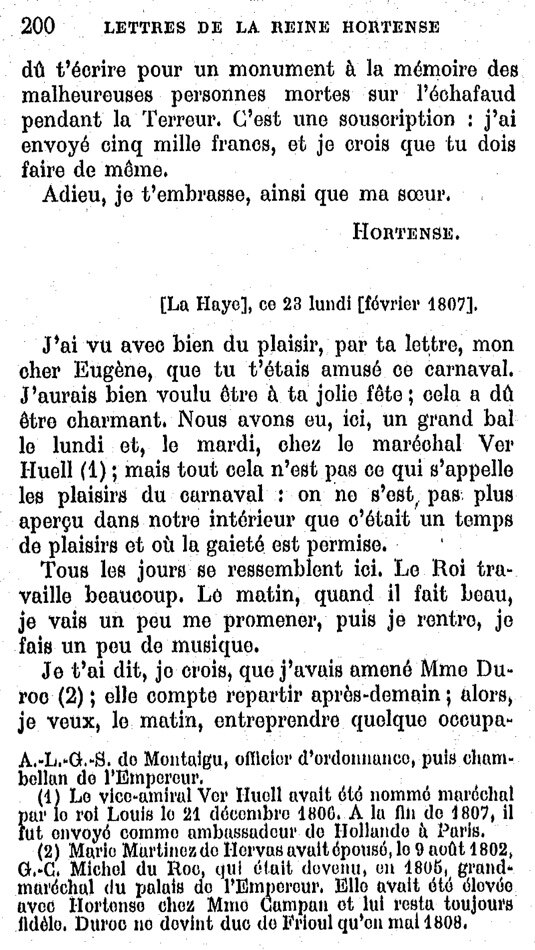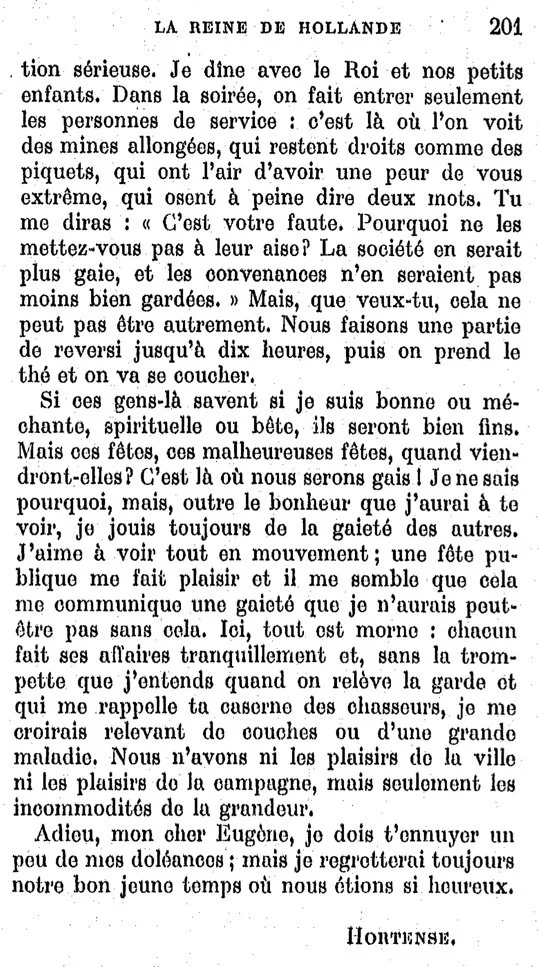This is part of a series where we translate letters from Napoleon’s stepdaughter Hortense to her brother Eugene. When we last left off, Josephine and Hortense were hoping to go see Napoleon.
As we have discussed, Napoleon meets Marie Walewska around this time and cancels their trip - a trip which would’ve made his family furious if he had let Hortense come - as it would’ve emphasized the strange dynamic between Napoleon and Hortense. There were always rumors that Napoleon made Hortense marry his brother Louis as a cover for their ongoing affair and that her children were really fathered by Napoleon. These rumors and the obvious adoration between Napoleon and Hortense poisoned circumstances - especially the mind of Louis.
Now that Napoleon has shut himself up in his winter quarters, Hortense and Josephine have to go back to their respective homes, Holland and France. Hortense sounds depressed in her letters to her brother Eugene.
…
Mayence, this 12th of January, 1807.
I send you a letter from the King; you probably have the news. The Emperor has settled down in winter quarters and he is now in Warsaw; he is not yet talking about his plans, but I hope his first letter will tell us about them.
I received a pretty mosaic from your wife; thank her for me, I will write her soon.
I am very glad that Madame Frangeau pleases her: she is a very good woman.
Goodbye, I kiss you.
HORTENSE.
…
Mayence, this Monday, the 19th of January 1807.
I'm leaving next Saturday, my dear Eugène, and I have less regret about it since it is decided that the Empress will no longer travel to Berlin.
The Emperor wrote to her to return to Paris (1). From this
…
(1) Napoleon to Joséphine, Warsaw, January 7th, 1807: "Return to Paris to spend the winter there". From the same to the same, Warsaw, Jan. 8, 1807: “Josephine, I would pray you to return to Paris. The season is too bad, the roads are and hateful and the spaces too considerable for me to allow you to come here where my business keeps me, (Letters from Napoleon to Josephine, loc. Cit., I, 234 and 286). The Empress left Mayence to return to Paris, the 26th of January.
…
it appears, he is not ready to return; we will negotiate without a doubt, but if the negotiations do not succeed, we will start fighting again in the spring; it's really sad.
When will we see each other? God knows it; however, it is to be hoped that these blessed events will come; they are eagerly awaited!
I then hope to go to Paris; but that happiness may be far away.
Farewell, my dear Eugène, I love you and embrace you with all my heart. Napoleon was a little sick, but he is fine now. I kiss my sister.
HORTENSE.
…
The Hague, this Sunday, February 1, 1807. I arrived Thursday evening at The Hague (1), my dear Eugène; I am well as well as Napoleon. Everyone was very sad about this unfortunate accident that happened in Leiden, and it's hard to imagine something so horrible. (2).
I was very well received here. Mom must be in Paris by now. We are in great uncertainty about the events and it is very sad.
Finally, patience is needed in everything. Mme. de Montaigu (3)
…
(1) Queen Hortense arrived at The Hague on the 29th of June 1807 at Louis' insistence.
(2) On January 12, 1807, a boat loaded with casks of powder had exploded on one of the canals of Leiden. Most of the houses in the neighborhood were damaged,
(3) B.-F.-C. de Maillé de la Tour Landry had married A.-L.-G.-S. de Montaigu, ordinance officer, then chamberlain of the Emperor.
…
must have written to you for a monument in memory of the unfortunate people who died on the scaffold during the Terror. It's a subscription: I sent five thousand francs, and I think you should do the same.
Goodbye, I kiss you and my sister.
HORTENSE.
…
The Hague, this Monday the 23th of February, 1807.
I saw with great pleasure, through your letter, my dear Eugène, that you had fun this carnival.
I would have liked to be at your pretty party; it must have been charming.
We had a great ball here on Monday and, on Tuesday, at Marshal Ver Huell's (1); but all that is not what is called the pleasures of carnival: we did not have fun, it was like we didn’t realize it was a time of pleasure where cheerfulness is allowed.
Every day looks the same here. The King works a lot.
In the morning, when the weather is nice, I go for a walk, then I come back and I play some music.
I told you, I believe, that I had brought Madame Duroc here (2); she plans to leave the day after tomorrow; so, I want, in the morning, to undertake some occupation of
…
(1) Vice-Admiral Ver Huell had been appointed Marshal by King Louis on December 21, 1806. At the end of 1807, he was asked to become Holland's ambassador to Paris.
(2) Maria Martinez de Hervas had married, on August 9th, 1802, Christophe Michel Duroc, who had become, in 1805, Grand Marshall of the palace of the Emperor. She had grown up with Hortense at Mme. Campan’s school and always remained loyal. Duroc doesn’t become Duke de Frioul until May, 1808.
…
serious consideration. I dine with the King and our little children. In the evening, we only bring in the people on duty: this is where we see elongated columns, which remain upright like stakes, who seem to have an extreme fear of you, who dare to hardly say two words.
You will say to me: "It is your fault. Why don't you make them feel comfortable? Society would be happier, and the forms would still be no less well looked after.”
But, what do you want, it cannot be otherwise. We play a game of reversi until ten o'clock, then we take tea and go to bed.
If these people think I am good or mean, spiritual or stupid, they will still be fine.
But these festivals, these unhappy festivals, when will they come? This is where we will be happy! I do not know why, but besides the happiness of thinking that I will see you, I still always enjoy the cheerfulness of others.
I like to see everything in motion; a public feast makes me happy and it seems to me that it communicates to me a gaiety that I might not have without it.
Here, everything is gloomy, everyone does their business quietly and, without the trumpet that I hear when we stand guard and who reminds me of your hunting routine, I would believe myself to be dealing with unpleasant business or a great illness.
We have neither the pleasures of the city, nor the pleasures of the country, but only the inconveniences of grandeur. Farewell, my dear Eugòne, I must bore you a little bit of our grievances; but I will always miss our good youth when we were so happy.
Hortense.
Les femmes devaient distraire de sa passion pas si cachée.
Cela fait partie d'une série où nous traduisons des lettres de la belle-fille de Napoléon Hortense à son frère Eugène. La dernière fois que nous nous sommes arrêtés, Joséphine et Hortense espéraient aller voir Napoléon.
Comme nous en avons discuté, Napoléon rencontre Marie Walewska à cette époque et annule leur voyage - un voyage qui aurait rendu sa famille furieuse s'il avait laissé Hortense venir - car cela aurait souligné l'étrange dynamique entre Napoléon et Hortense.
Il y avait toujours des rumeurs selon lesquelles Napoléon avait obligé Hortense à épouser son frère Louis pour couvrir leur affaire en cours et que ses enfants étaient vraiment engendrés par Napoléon.
Ces rumeurs et l'adoration évidente d'Hortense pour Napoléon ont empoisonné leur vie. Maintenant que Napoléon s'est enfermé dans ses quartiers d'hiver, Hortense et Joséphine doivent retourner dans leurs foyers respectifs, la Hollande et la France. Hortense semble déprimée dans ses lettres à son frère Eugène.






